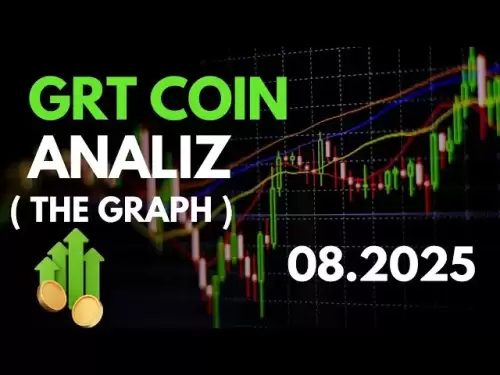-
 Bitcoin
Bitcoin $119300
2.40% -
 Ethereum
Ethereum $4254
-0.20% -
 XRP
XRP $3.184
-1.38% -
 Tether USDt
Tether USDt $1.000
0.00% -
 BNB
BNB $803.9
0.58% -
 Solana
Solana $183.1
1.50% -
 USDC
USDC $0.0000
0.01% -
 Dogecoin
Dogecoin $0.2339
-2.87% -
 TRON
TRON $0.3384
0.88% -
 Cardano
Cardano $0.8018
-0.29% -
 Hyperliquid
Hyperliquid $45.13
3.14% -
 Chainlink
Chainlink $22.10
0.96% -
 Stellar
Stellar $0.4439
-0.94% -
 Sui
Sui $3.875
-0.73% -
 Bitcoin Cash
Bitcoin Cash $570.7
0.24% -
 Hedera
Hedera $0.2589
-2.90% -
 Ethena USDe
Ethena USDe $1.001
-0.01% -
 Avalanche
Avalanche $23.83
-1.73% -
 Litecoin
Litecoin $123.8
2.61% -
 Toncoin
Toncoin $3.351
-1.13% -
 UNUS SED LEO
UNUS SED LEO $9.103
1.13% -
 Shiba Inu
Shiba Inu $0.00001356
-1.40% -
 Uniswap
Uniswap $10.93
-0.19% -
 Polkadot
Polkadot $4.057
-1.97% -
 Dai
Dai $1.000
0.01% -
 Cronos
Cronos $0.1646
4.66% -
 Ethena
Ethena $0.7974
8.11% -
 Pepe
Pepe $0.00001208
-2.89% -
 Bitget Token
Bitget Token $4.445
-1.70% -
 Monero
Monero $268.8
-2.00%
Do the mining apps on the rankings provide real-time data monitoring?
No, mining app real-time data accuracy varies widely; blockchain speed, app infrastructure, and data sources all impact update frequency, with many apps offering delayed snapshots instead of continuous updates. Thorough research is crucial before relying on any app's data.
Mar 03, 2025 at 09:06 am
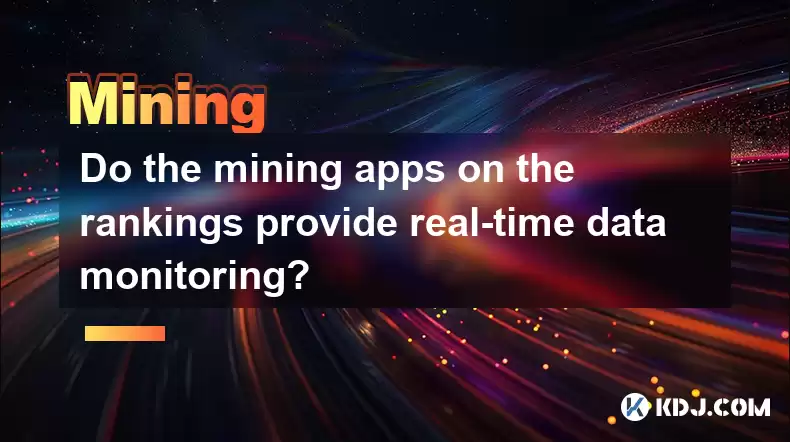
Key Points:
- Mining app ranking accuracy varies greatly. Real-time data monitoring isn't universally available.
- Data delays depend on the app's design, data source, and the specific cryptocurrency.
- Factors influencing real-time capability include blockchain network speed and app infrastructure.
- Many apps offer delayed data, providing snapshots rather than continuous updates.
- Users should carefully check an app's features and reviews before relying on its data.
Do the mining apps on the rankings provide real-time data monitoring?
The question of real-time data monitoring in cryptocurrency mining apps listed on various ranking platforms is complex. The answer, unfortunately, is not a simple "yes" or "no." The availability of real-time data varies significantly depending on the specific app, its developers, and the underlying cryptocurrency's blockchain. Many apps, even those highly ranked, might not offer the continuous, instantaneous data updates one might expect.
The accuracy and timeliness of data presented by mining apps are crucial factors for miners. Real-time information allows for immediate adjustments to mining strategies, potentially maximizing profitability and efficiency. However, the nature of blockchain technology and the limitations of app development often introduce delays.
Blockchain networks themselves operate at varying speeds. Some cryptocurrencies process transactions much faster than others. This directly impacts how quickly mining apps can receive and display updated information about mining progress, hash rates, and block rewards. A slower blockchain naturally leads to delays in data reflected in the app.
Furthermore, the infrastructure of the mining app itself plays a crucial role. The app's servers, data processing capabilities, and the frequency of data updates from the blockchain all contribute to the speed and accuracy of the displayed information. Apps built with less robust infrastructure are more likely to exhibit significant data lag.
Many popular mining apps prioritize user-friendliness over raw speed. They may provide periodic snapshots of mining data, offering updates at intervals rather than a constant stream of live information. While this approach might simplify the user experience, it compromises the real-time aspect often desired by serious miners. This delayed data still offers valuable insights, but it's not suitable for rapid decision-making based on immediate changes in network conditions.
The data sources utilized by the app also influence the real-time capability. Some apps rely on publicly available blockchain explorers, while others might utilize proprietary data feeds. The speed and reliability of these sources significantly affect the app's data refresh rate. Apps using less efficient data sources will naturally suffer from slower updates.
Before relying on any mining app for critical real-time data, users should thoroughly investigate its features. Reading reviews from other users can provide valuable insights into the app's actual performance and the reliability of its data updates. Checking the app's description for specific details about data refresh rates is also crucial. Don't solely rely on the app's ranking to judge its real-time data capabilities.
It's also important to note that many mining apps focus on aspects beyond pure real-time data. Some prioritize user-friendly interfaces, comprehensive analytics, or community features. These apps might provide excellent overall mining management tools even if they don't offer the absolute fastest data updates.
The best approach is to test several apps and compare their data against other sources, such as independent blockchain explorers. This will help you determine which app provides the most accurate and timely data for your specific needs and chosen cryptocurrency. Remember, there's no one-size-fits-all solution, and the ideal app will vary based on individual priorities.
Common Questions:
Q: How can I tell if a mining app provides real-time data?
A: Look for explicit statements about data refresh rates in the app's description or FAQ section. Check user reviews to see if users report any significant delays. Compare the app's data to independent blockchain explorers for verification.
Q: What are the consequences of using an app with inaccurate or delayed data?
A: Inaccurate or delayed data can lead to poor mining decisions, potentially resulting in reduced profitability, missed opportunities, or even financial losses. It might cause you to misallocate resources or miss crucial shifts in network conditions.
Q: Are all high-ranking mining apps reliable for real-time data?
A: No. App rankings don't guarantee real-time data accuracy. Rankings often reflect factors beyond data speed, such as user interface, features, and overall user experience. Always verify the data's timeliness independently.
Q: Can I improve the real-time data of a mining app?
A: You can't directly improve the app's data unless you are the developer. However, ensuring you have a strong internet connection can help minimize delays related to network issues on your end.
Q: What are some alternative sources for real-time mining data?
A: Many independent blockchain explorers provide real-time data on various cryptocurrencies. These explorers offer a way to verify the data displayed in your mining app. However, even blockchain explorer data might have slight delays.
Disclaimer:info@kdj.com
The information provided is not trading advice. kdj.com does not assume any responsibility for any investments made based on the information provided in this article. Cryptocurrencies are highly volatile and it is highly recommended that you invest with caution after thorough research!
If you believe that the content used on this website infringes your copyright, please contact us immediately (info@kdj.com) and we will delete it promptly.
- Pudgy Penguins, Bitcoin Penguins, and the $22M Meme Coin Mania: A New York Perspective
- 2025-08-11 17:10:11
- Bitcoin L2 Heats Up: SatLayer (SLAY) Lists on KuCoin Amidst Layer-2 Boom
- 2025-08-11 16:50:12
- Bitcoin Price Eyes New All-Time High: Can It Break the $122K Resistance?
- 2025-08-11 16:30:12
- Bitcoin: From Speculative Asset to Reserve Currency in a Decentralized World?
- 2025-08-11 16:30:12
- MultiBank Group, Record Results, and the $MBG Token: A New Era?
- 2025-08-11 14:50:12
- Bitcoin FilmFest 2026: Warsaw's Unexpected Crypto-Cinema Blockbuster
- 2025-08-11 14:30:12
Related knowledge

How to configure Phoenix Miner for AMD GPUs?
Aug 11,2025 at 03:21am
Understanding Phoenix Miner and Its Compatibility with AMD GPUsPhoenix Miner is a lightweight, high-performance Ethereum mining software designed for ...
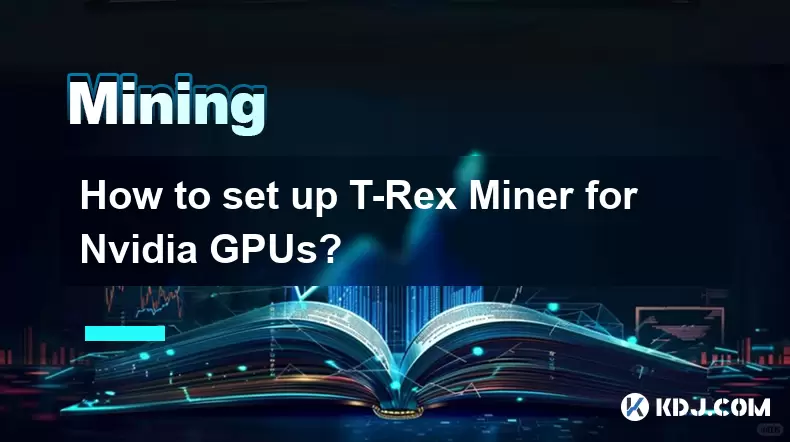
How to set up T-Rex Miner for Nvidia GPUs?
Aug 10,2025 at 12:07am
Understanding T-Rex Miner and Its Compatibility with Nvidia GPUsT-Rex Miner is a high-performance mining software designed specifically for Nvidia GPU...
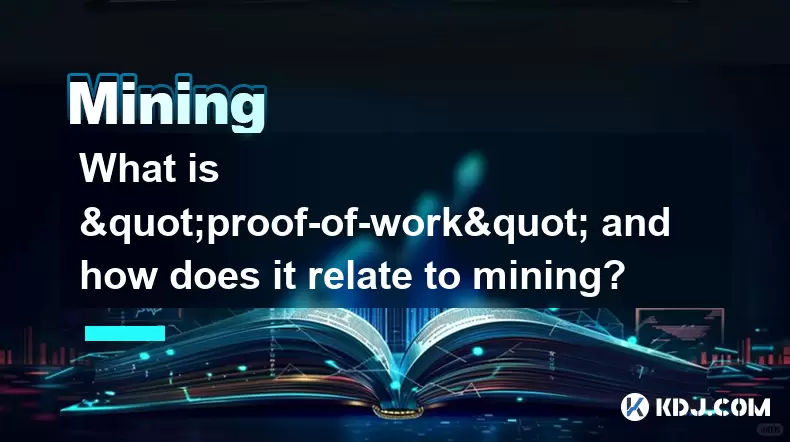
What is "proof-of-work" and how does it relate to mining?
Aug 07,2025 at 02:03pm
Understanding the Concept of Proof-of-WorkProof-of-work (PoW) is a consensus mechanism used in blockchain networks to validate transactions and secure...
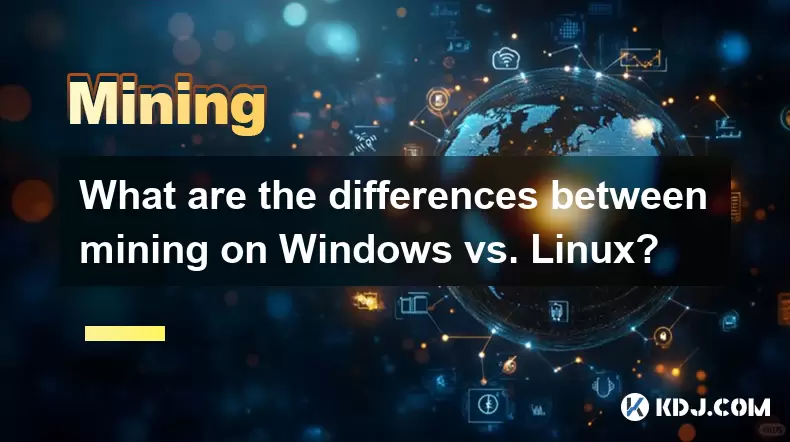
What are the differences between mining on Windows vs. Linux?
Aug 06,2025 at 11:29pm
Overview of Cryptocurrency Mining PlatformsCryptocurrency mining involves using computational power to solve complex cryptographic puzzles and validat...
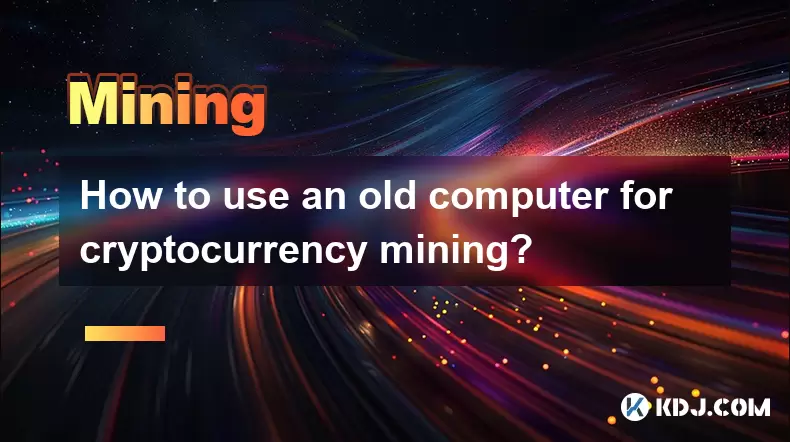
How to use an old computer for cryptocurrency mining?
Aug 07,2025 at 12:42pm
Understanding the Feasibility of Using an Old Computer for MiningUsing an old computer for cryptocurrency mining may seem outdated, but it is still te...
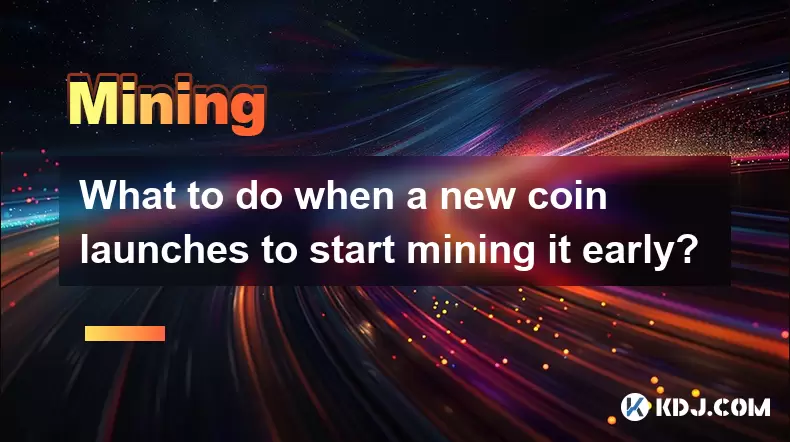
What to do when a new coin launches to start mining it early?
Aug 11,2025 at 01:15am
Understanding the Early Mining WindowWhen a new coin launches, the initial phase presents a unique opportunity for miners to gain a competitive edge. ...

How to configure Phoenix Miner for AMD GPUs?
Aug 11,2025 at 03:21am
Understanding Phoenix Miner and Its Compatibility with AMD GPUsPhoenix Miner is a lightweight, high-performance Ethereum mining software designed for ...

How to set up T-Rex Miner for Nvidia GPUs?
Aug 10,2025 at 12:07am
Understanding T-Rex Miner and Its Compatibility with Nvidia GPUsT-Rex Miner is a high-performance mining software designed specifically for Nvidia GPU...

What is "proof-of-work" and how does it relate to mining?
Aug 07,2025 at 02:03pm
Understanding the Concept of Proof-of-WorkProof-of-work (PoW) is a consensus mechanism used in blockchain networks to validate transactions and secure...

What are the differences between mining on Windows vs. Linux?
Aug 06,2025 at 11:29pm
Overview of Cryptocurrency Mining PlatformsCryptocurrency mining involves using computational power to solve complex cryptographic puzzles and validat...

How to use an old computer for cryptocurrency mining?
Aug 07,2025 at 12:42pm
Understanding the Feasibility of Using an Old Computer for MiningUsing an old computer for cryptocurrency mining may seem outdated, but it is still te...

What to do when a new coin launches to start mining it early?
Aug 11,2025 at 01:15am
Understanding the Early Mining WindowWhen a new coin launches, the initial phase presents a unique opportunity for miners to gain a competitive edge. ...
See all articles





















